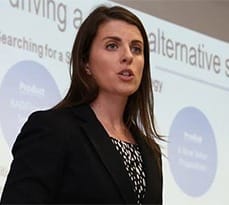They’re often called “soft skills” but the reality is they’re anything but: the skills you learn to help you deal with people are not only some of the hardest things to learn but could also make a massive difference to your success in business and just how much a company values you. There’s nothing “soft” about it.
“Learning to deal with people is a fundamental aspect of a successful business,” says Cambridge MBA Lecturer Keith Goodall. “Self-awareness and an ability to interact, react and adapt can be the difference between success and failure.”
And while these tools are arguably the most difficult of all business skills to acquire, MBA graduates consistently rate them the most valuable lesson they were ever taught. So don’t, says Goodall, call them soft skills. “If anything this is one of the hardest parts of the MBA,” he says.
While some companies are content to pay lip service to their importance, there is a growing phenomenon in business to truly recognise the impact that these interpersonal skills can have. It’s all about flexibility, reflection and awareness of your own reactions, says Goodall, who runs Cambridge Judge Business School’s eight-week ‘Management Praxis’ course on the Cambridge MBA.
“As you get promoted as a manager different skills come into play,” says Goodall. “The fact is that a lot of middle managers get to a certain point in their organisation and then derail. Why? Because what gets you hired as a strong, focused, energetic individual contributor can later get you fired. Some people don’t have the additional skills to take them further.”
That “derailing” comes down to a number of main reasons. “If you’re insensitive or arrogant, it’s hard to build relationships within departments or across an organisation,” says Goodall. “You can’t build and lead a team if you can’t trust and give space to subordinates. A hard thing to learn is that the people you need most to balance your own behaviour could be those you find the most irritating; it’s important to find their strengths and put them to good use – and not just rely on your gut feeling about them. You can’t develop if you can’t get beyond the narrow goals of an individual contributor by adapting to your colleagues, working with different cultures and attitudes and developing an ability to see the big picture.”
The theory sounds great. So how does Cambridge Judge give its MBA students these new skills? “The course is very challenging,” says Goodall. “In the first four weeks, we give teams tasks to do – and often they fail or don’t achieve the optimum result. But it is the response to failure that is crucial. They analyse what has happened and reflect on how their assumptions, perceptions and attitudes might have contributed to the result. We all try things that don’t work – the skill is to be able to be that bit quicker to react: reflect, be flexible and adapt.”
The students then take these skills and this self-awareness into the Cambridge Venture Project – where MBA students work as a team of consultants, typically in a local business, addressing a specific market need – and then return to the classroom to analyse their performance. Their final assessment is based on a reflective essay using concepts from the course: what have they learned about leadership, teamwork and, crucially, about themselves as a result of trying to deliver this project. What will they do differently, or the same, in their next team?
“Management Praxis is about taking into account the task, the people, the environment and the context – with you and your perceptions and assumptions in the middle. The environment may well change so you have to shift your focus between the task and the people – increasing or reducing control, for example. The key tension on the course is between the task – achieving your objectives – and the process – how do I need to behave to get this task done with these people in this situation?”

Cambridge’s world-famous collaborative approach was what brought Sarah Broderick to the Cambridge MBA. She says she was aware of the value of the interpersonal skills but the Praxis course – and particularly the way she applied its lessons during the Global Consulting Project (GCP) – took her understanding to a new level.
“I worked with Iberdrola in Spain with their corporate venture capital (CVC) team, soft skills were vital for that, particularly interfacing with other venture capital firms and organisation’s internal CVC teams.” she says. “The GCP enhanced my social skills, such as how to interview people, how to engage and how to get ask the questions that will lead to the information you need. Even the simplest conversations about a various subjects genuinely start to build relationships.
“And when someone reacts unexpectedly to something you’ve said, you learn their reaction is not necessarily about you and what you have done in that moment – it could be because of something that happened to them that morning or last week which had nothing to do with you.”
The key is that ability to react, reflect and adapt, says Goodall. “A lot of exercises we do on the course are about what happens under time and task pressure. There’s a physiological effect – our vision narrows, we lose the ability to hear, our heart rate increases. As a result, we tend to lose situational awareness. But if you can learn to maintain that situational awareness, and hold the bigger picture in mind under pressure then you’re more likely to be welcome on a senior team.
“It’s also about the challenge of teaching smart people how to learn” he adds. “If you’ve done well at school and at university, got a good job, been promoted and got your MBA from Cambridge and then suddenly you run into trouble you might think: ‘Well the problem can’t be me, because I’m the boss’, or even: ‘The problem can’t be me, I’ve got an MBA’. This is a natural defensiveness – we instinctively and usefully defend ourselves against feeling incompetent – but if the defences are too strong we fail to learn because we blame others for our failures and don’t reflect on our own behaviour. The key question here is ‘What might I have contributed to this failure?”. Students on the programme are challenged to learn about themselves as they move between quantitative skills and the implementation of those skills in dynamic, uncertain contexts such as their consulting projects”.
Cambridge’s peer-to-peer learning helped Sarah Broderick to do that. “I worked in the private equity industry which is very results oriented. But no transaction is remote from people. Before I came to the MBA I had worked on my own personal skills but I wanted validation,” she says. “The biggest thing is listening to classmates. It’s good to hear people say: ‘I never thought of it that way.’ You come to understand when someone is tuned in and when they’re not, and how you deal with it.”
Goodall agrees peer relationships are a key part of learning such skills. “We try to run the class as a dialogue,” he says. “There are no written case studies – the consulting teams and the MBA streams are the case studies. It’s an opportunity to practise interpersonal skills in a relatively safe environment. After failing on a task, we hope you can be honest and say: ‘I screwed up.’ Failure is important, it prompts discussion and learning. As a manager what is our attitude to someone else’s failure? What does our face look like when someone fails and what impact does our reaction have on their future willingness to try new things?”
The Praxis course arms students with tools they may not even necessarily need immediately in their next job – but when they are required, they are there. “Some students are initially cynical and only later see the value of these skills,” says Goodall. “We’ve had people who did the course several years ago email to say “I finally get it. Those skills helped me yesterday”.
The Praxis course helps students understand that there is no one right way to run a team or an organisation. “We have no prejudice about a ‘correct’ management style,” says Goodall. “We have no problem with very directive styles. But it is also about learning tolerance, being supportive and being adaptive to the people above and below you. The object is not to undergo a personality change, it is to be yourself with more skill.”


